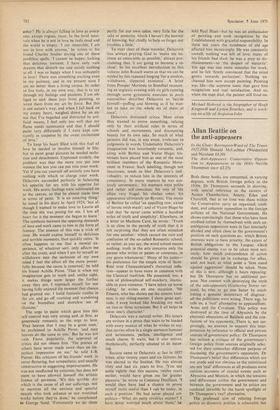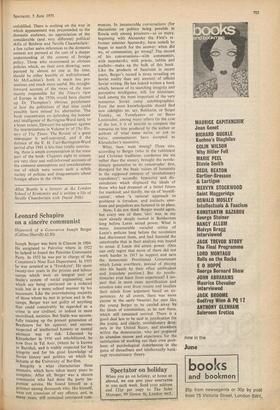Allan Beattie on the anti-appeasers
The Anti-Appeasers: Conservative Opposi- tion to Appeasement in the 1930s Neville Thompson (our £2.25)
Both these books are concerned, in varying degrees, with British foreign policy in the 1930s. Dr Thompson succeeds in showing, with special reference to the careers of Austen Chamberlain, Amery, Eden and Churchill, that at no time was there within the Conservative party an organised, confi- dent, and coherent opposition to the foreign policies of the National Government. He shows convincingly that those who have been credited (often by themselves) with such un- ambiguous opposition were in fact internally divided and often close to the government's position on such questions as: which British interests were to have priority; the extent of British obligations to the League; which potential enemy was to be taken most seri- ously; how much independence of action should be given up in exchange for allies, and, not least, at what point a 'firm stand against aggression' should be taken. None of this is new, although it bears repeating; but Dr Thompson has an additional pur- pose. Not content with destroying the myth of the anti-appeasers (Gathering Storm ver- sion), he tries to go one better by estab- lishing a genuine democracy of disgrace : all the politicians were wrong. There wis, he tells us, a 'real' alternative to appeasement. Arms and the Covenant. This policy was destroyed at. the time of. Abyssinia by the electoral obsessions of Baldwin and the con- fusions of his opponents. There is, not sur- prisingly, no attempt to support this inter- pretation by reference to official and private sources of government policy: Dr Thompson has written a critique of the government's foreign policy from sources originally selec- ted for their somewhat different purpose of discussing the government's opponents. Dr Thompson's belief that differences which are not crude and not obvious to the uninitiated arc not 'real' differences at all produces some curious accounts of crucial events such as Abyssinia and Munich, in which the tensions and differences within the government and between the government and its critics are rendered invisible by the harsh spotlight of Dr Thompson's 'real' alternative.
The professed aim of relating foreign policy to domestic politics is admirable but unfulfilled. There is nothing on the way in which appeasement was propounded to the domestic audience, no appreciation of the considerable (and very different) political skills of Baldwin and Neville Chamberlain: a few rather naive references to the domestic context are pursued at the cost of a deeper understanding of the content of foreign policy. Those who recommend as obvious policies which, on their own showing, were pursued by almost no one at the time, should be either humble or well-informed. Mr McLachlan's book is much less pre- tentious and much more useful. His straight. forward account of the views of the man mainly responsible for the Times's view of Europe in the 1930s would have cleared up Dr Thompson's obvious puzzlement at how the politicians of that time could possibly have missed his alternative. The book concentrates on defending the honour and intelligence of Barrington-Ward (and, to a lesser extent, Dawson) the appeaser, against the interpretations in Volume iv of The His- tory of The Times. The flavour of a great newspaper is well-conveyed, and if the defence of the E. H. Carr-Barrington-Ward period after 1941 is less than totally convinc- ing, there is ample compensation in the main part of the book: Chapters eight to sixteen are very clear and well-informed accounts of the common assumptions and considerations out of which were woven such a subtle variety of policies and disagreements about foreign affairs in the 1930s.
Allan Beattie is a lecturer at the London School of Economics and is writing a life of Neville Chamberlain with David Dilks



































 Previous page
Previous page